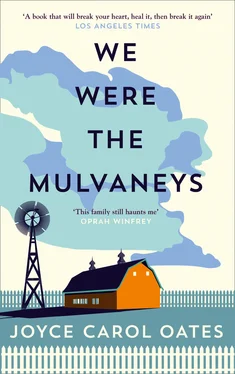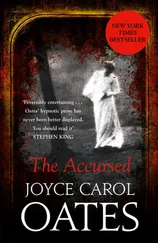Patrick Mulvaney a genius? Come on! His I.Q. was only 151. In tenth grade he’d taken a battery of tests, with a half dozen other selected students. You weren’t supposed to know the results but somehow Patrick did. Possibly his mom had told him, absurdly proud.
Not a genius but still rumors spread. Like the rumor that he was blind in one eye. Did Patrick care, Patrick did not care. Telling himself he’d rather be respected and feared at Mt. Ephraim High School than liked. Popular!
His heroes were Galileo, Newton, Charles Darwin. The Curies, Albert Einstein. The scientists of whom he read voraciously in the pages of Scientific American , to which he subscribed. You couldn’t imagine any of these people caring in the least about popularity .
It did upset him, though, that everyone seemed to know his secret: he was in fact blind in one eye. Almost.
Mom had surely confided in his gym teacher, when he’d started high school. She’d promised she would not but probably yes it had been Mom, meaning well. Not wanting his other eye to be injured—that would have been her logic, Patrick could hear her pleading, could see her wringing her hands. Patrick had had an accident grooming one of the horses, in fact his own horse Prince he’d loved, young high-strung Prince who was both docile and edgy and somehow it happened that the two-year-old gelding was spooked in his stall by something fleeting and inconsequential as a bird’s whirring wings and shadow across a sunlit bale of hay and suddenly to his terror Patrick, at that time twelve years old, weighing not much more than one hundred pounds, was thrown against a wall, found himself down beneath the horse’s terrible malletlike hooves screaming for help. His left arm had been broken and his left eye swollen shut, the retina detached and requiring emergency surgery in Rochester. Of the experience Patrick recalled little, out of disgust and disbelief. It had long wounded his pride that of the Mulvaneys he was the only one obliged to wear glasses.
Driving, Patrick shut his left eye, looked with his right eye at the snowy road ahead, the waning glare of the snow, the rocky slope down into the Valley. This should have been a familiar landscape but was in fact always startling in its newness, its combination of threat and promise. He was never able to explain to anyone not even to Marianne how fascinating it was, that the world was there; and he, possessed of the miracle of sight, here . He would no more take the world there for granted than he would take being here for granted. And vision in his right eye at least. For the eye was an instrument of observation, knowledge. Which was why he loved his microscope. His homemade telescope. Books, magazines. His own lab notebooks, careful drawings and block-print letters in colored inks. The chunky black altimeter/barometer/“illuminator” sports watch he wore day, night, awake, asleep, removing only when he showered though in fact the watch (a birthday gift from the family, chosen by Marianne out of the L.L. Bean catalogue) was guaranteed waterproof—of course. And he loved his shortwave radio he’d assembled from a kit. Plying him on insomniac nights with weather reports in the Adirondacks, Nova Scotia. As far away as the Canadian Rockies.
You could trust such instruments and such knowledge as you could not trust human beings. That was not a secret, merely a fact.
Patrick was driving his mom’s Buick station wagon carefully along this final stretch of High Point Road. He was thinking that the horizon he’d grown up seeing without knowing what he saw here in the Chautauqua Valley, 360 degrees of it, was a hinge joining two spaces: the one finite, a substance inadequately called “land” that dropped to the Yewville River, invisible from this distance, and the other infinite, a substance inadequately called “sky” overhead. Each was an unknown. Though Patrick tried to imagine the glacier fields of millions of years ago, an epoch to which had been given the mysterious name Pleistocene which was one of Patrick’s words reverently spoken aloud when he was alone.
Pleistocene . Mile-high mountains of ice grinding down everything in their paths.
You could see Patrick was hurt, obviously it showed in his face. If Marianne had noticed.
Gunning the motor as he turned up the rutty-snowy drive, racing the station wagon in the home stretch to announce Here we are! And parking noisily in front of the antique barn inside which Corinne was working. Marianne might have begun to say, “Thank you, Patrick—” but she spoke too softly, already he was out of the vehicle, in one of his quick-incandescent and wordless furies, and there came Silky exploding comically out of the rear of the vehicle too, to dash about in the snow, urinating in dribbles, shaking his ears as if he’d been confined for days. Marianne was carrying her garment bag in the direction of the back door and somehow the plastic handle slipped from her fingers and Patrick hesitated before helping her to retrieve it and Marianne said quickly, her voice quavering, fear in her eyes that were a damp blurred blue Patrick would afterward recall, “No!—it’s fine, I have it.” Marianne smiled at him, unconvincingly. Her tall impatient brother loose-limbed and nerved-up as one of the young horses. “Suit yourself,” Patrick said. He shrugged as if, another time, he’d been subtly but unmistakably rebuffed, turned to slam into the house, upstairs to his room, his books.
It’s fine, I have it. It’s fine .
Many things were coded at High Point Farm. Like our names which could be confusing for they depended upon mood, circumstance, subtext.
For instance, Michael Sr. was usually Dad but sometimes Curly and sometimes Captain. He could be Grouchy (of the Seven Dwarves), or Groucho (of Groucho Marx fame), he could be Big Bear, Chickie, Sugarcake—these names used exclusively by Mom. My oldest brother was usually just Mike but sometimes Mike Jr. or Mikey-Junior; sometimes Big Guy, Mule, Number Four (his football jersey number for the three years he excelled as a fullback at Mt. Ephraim High). Patrick was frequently P.J. (for Patrick Joseph) or Pinch. Marianne was frequently Button or Chickadee. My names, as I’ve said, were many, though predominantly Baby, Dimple, Ranger.
Mom was Mom except for special names which only Dad could call her (Darling, Honeylove, Sweetheart, Sugarcake). Occasionally Mom could be called Whistle—but only within the family, never in the presence of outsiders.
It was a matter of exquisite calibration, tact. Which code name at which time. Especially in Mom’s case, for there were times when being called Whistle seemed to vex her and other times when it was exactly what she wanted to hear—she would laugh, and blush, and roll her eyes as if her innermost soul had been exposed.
Why Whistle? Because Mom had a habit of whistling when she believed herself alone, and to those of us who overheard, her whistling was a happy contagious sound. In the kitchen, in the antique barn; tending the animals; in her garden through the long summer and into the fall. Mom’s whistling was loud and assured as any man’s but with a shift of mood it could turn liquid and lovely as a flute. You’d listen, fascinated. You’d think Mom was speaking to you, without exactly knowing it, herself. Locking stanchions around the thick neck of a cow, scrubbing a horse’s mud- and manure-splattered coat, fending off enraged fowl who’d hoped to hide their eggs in the hay barn, especially in the early morning when she and our canary Feathers were the only ones up—there was Mom, whistling. “Faith of Our Fathers”—“The Battle Hymn of the Republic”—“Tell Me Why the Stars Do Shine”—but also “I’m Dreaming of a White Christmas” (a year-round favorite, to Dad’s exasperation)—“I’m Forever Blowing Bubbles”—“I’ll Be Seeing You”—“Heartbreak Hotel”—“Hound Dog”—“Blue Suede Shoes” (though Mom claimed to disapprove of Elvis as a poor moral example for the young). When she was in the house, Mom was likely to be whistling with Feathers, who, like most male canaries, responded excitedly when he heard whistling in or near his territory. Whistling was a quick expedient way of communicating with the livestock, of course: the horses whinnied alertly in reply, pricking their ears and flicking their tails as if to say Yes? Time to eat? Cows, goats, even sheep blinked to attention. Two deft fingers to her mouth, a shrill penetrating whistle, and Mom could bring dogs, cats, barnyard fowl and whatever else was in the vicinity to converge upon her where she stood, usually beneath one of the carports in an area designated for outdoor feeding, laughing and bountiful as the Goose Lady in our well-worn old copy of Grimm’s Fairy Tales.
Читать дальше












